Pope Francis in Africa: Is the continent the Catholic Church's great hope?
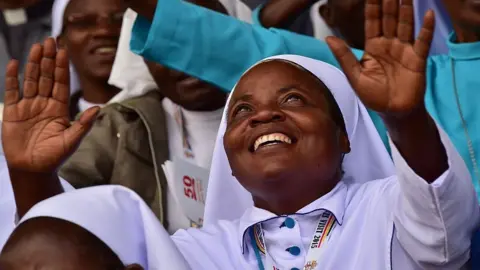 Getty Images
Getty ImagesPope Francis begins a three-nation visit to Africa later on Wednesday.
It will be his fourth visit to the continent since he became the head of the Roman Catholic Church in 2013, compared to the two his predecessor, Pope Benedict XVI, made during his eight-year papacy.
The importance of Africa to the Catholic Church can be summed up in a word - growth.
Africa has the fastest growing Catholic population in the world, while Western Europe, once regarded as the heartland of Christianity, has become one of the world's most secular regions, according to the US-based Pew Research Center.
And many of those who do identify themselves as Christian in Western Europe do not regularly attend church.
In contrast, Christianity, in its different denominations, is growing across Africa. The Pew Research Center predicts that by 2060 more than four in 10 Christians will be in sub-Saharan Africa.
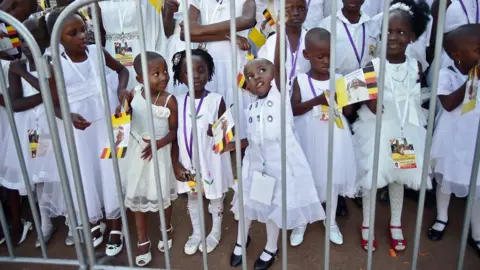 Getty Images
Getty ImagesAnd a study published by the US-based Center for Applied Research showed that in the period between 1980 and 2012 the number of Catholics in the world had increased by 57% to 1.2 billion, but growth in Europe was just 6%, compared to 283% in Africa. It put the number of Catholics in Africa at almost 200 million.
"I think Africa is where the future is really [for the Catholic Church]," says Nicolette Manglos-Weber, Assistant Professor of Religion and Society at Boston University's School of Theology.
Building schools and hospitals
The growth in Africa is partly because its overall population is increasing faster than that of any other continent.
However, there are other reasons - including the fact that by being part of the Catholic Church people are part of "a social institution that provides a lot of support and security in places where precarious living is very common and widespread," Dr Manglos-Weber says.
"The Church provides hospitals, schools, [and] other social services. [These are ] things that post colonial governments in… Africa have had a difficult time providing on a widespread scale."
The role of Catholics in offering such services "far surpasses what either Protestant churches or Islamic communities have been able to", Dr Manglos-Weber adds.
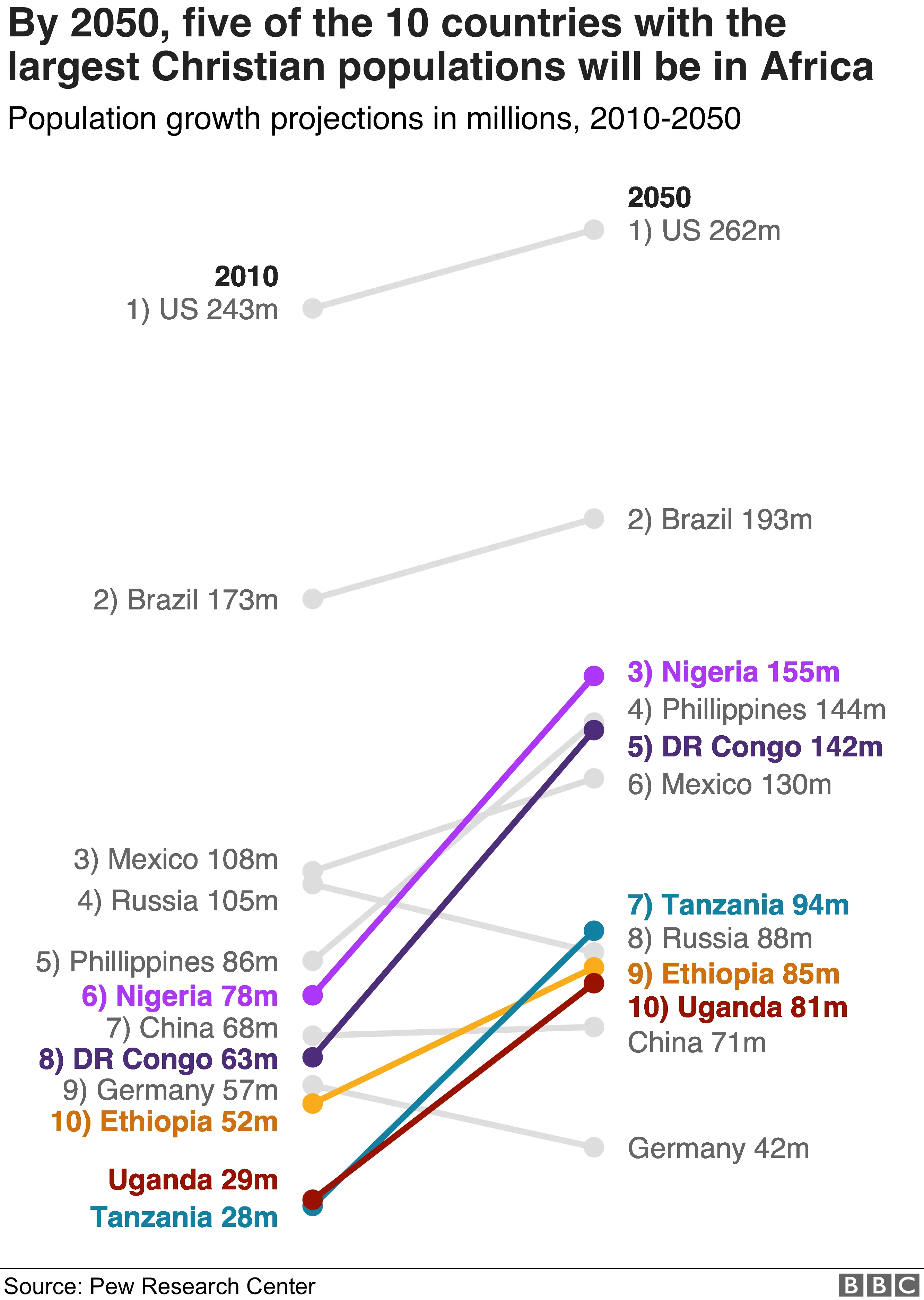
Pope Francis has also increased African representation in the upper echelons of the Catholic Church.
Although the majority of cardinals are still from Europe and South America, he has appointed 10 African cardinals, compared to the six of appointed by his predecessor.
Pope Francis is the first pontiff from the Global South, a term used to describe low and middle income countries in Africa, Asia and Latin America.
The Argentine has gained a reputation as a pope for the disenfranchised and the poor, and has focused on issues such as climate change and inequality in Africa.
The pope has already visited five African countries - Kenya, Uganda, Central African Republic, Egypt and Morocco - and on this latest trip, the pontiff will go to Mozambique and the island nations of Madagascar and Mauritius. His predecessor visited three African countries.
"The Holy Father wanted a very simple hotel, and rejected the first choice sent to the Vatican, asking for less expensive accommodation for his secretaries, undersecretaries, bishops and cardinals," a church leader in Mozambique was quoted by local media as saying.
On his 2015 visit to Kenya, Pope Francis went to Kangemi slum on the outskirts of the capital, Nairobi, and spoke out about what he called "new forms of colonialism".
He told the crowd that he wanted to "denounce the injustices which you suffer'', and referred to slums as "wounds" inflicted by the elite.

Pope Francis in brief
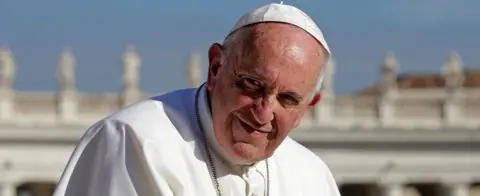 Reuters
Reuters- Born Jorge Mario Bergoglio on 17 December 1936 in Buenos Aires
- Ordained as a Jesuit in 1969
- Studied in Argentina, Chile and Germany
- Became Cardinal of Buenos Aires in 1998
- Seen as orthodox on sexual matters but strong on social justice

While the Pope's championing of the cause of the poor has been widely welcomed, the Church has also been hit by allegations of its clerics sexual abuse in Africa.
Last year the Southern African Catholic Bishops' Conference (SACBC) admitted that 35 cases of clerical abuse of minors have been reported in South Africa since 2003.
Three priests were defrocked, and one is serving a life sentence for the crime, the SACBC said.
In Liberia, a former priest wrote to the Vatican alleging sexually predatory behaviour by two bishops.
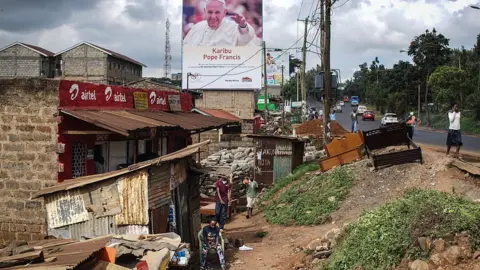 Getty Images
Getty ImagesOverall, the scandals appear to be "more isolated and irregular - certainly not on the same scale as those in North America, Europe or even South America," Professor Garth Abraham, head of South Africa's only Catholic tertiary institution, says.
But this does not mean that sex abuse on the part of Catholic clerics is less prevalent in Africa.
"Rather, I suspect, the problem remains hidden," Professor Abraham says.
The reason is unclear, but it may have to do with the fact that "traditionally, Africans are respectful of those in positions of authority and influence" and reporting "transgressions" requires courage and fearlessness that those "who are vulnerable do not necessarily have", he adds.
Although his critics would disagree, Professor Abraham argues that the cases of abuse are "aberrations".
"There remain hundreds of thousands of good men and women who have dedicated their lives to the service of others through the Catholic Church.
"This is particularly so in Africa, where, apart from the spiritual nourishment that the Catholic Church provides, she is making an important and positive contribution - sometimes the only contribution - to the betterment of the lives of the poor and the vulnerable," Professor Abraham says.
And that - alongside the huge demographic boost the continent is getting - helps explain why the future of the Catholic church does indeed lie in Africa.
